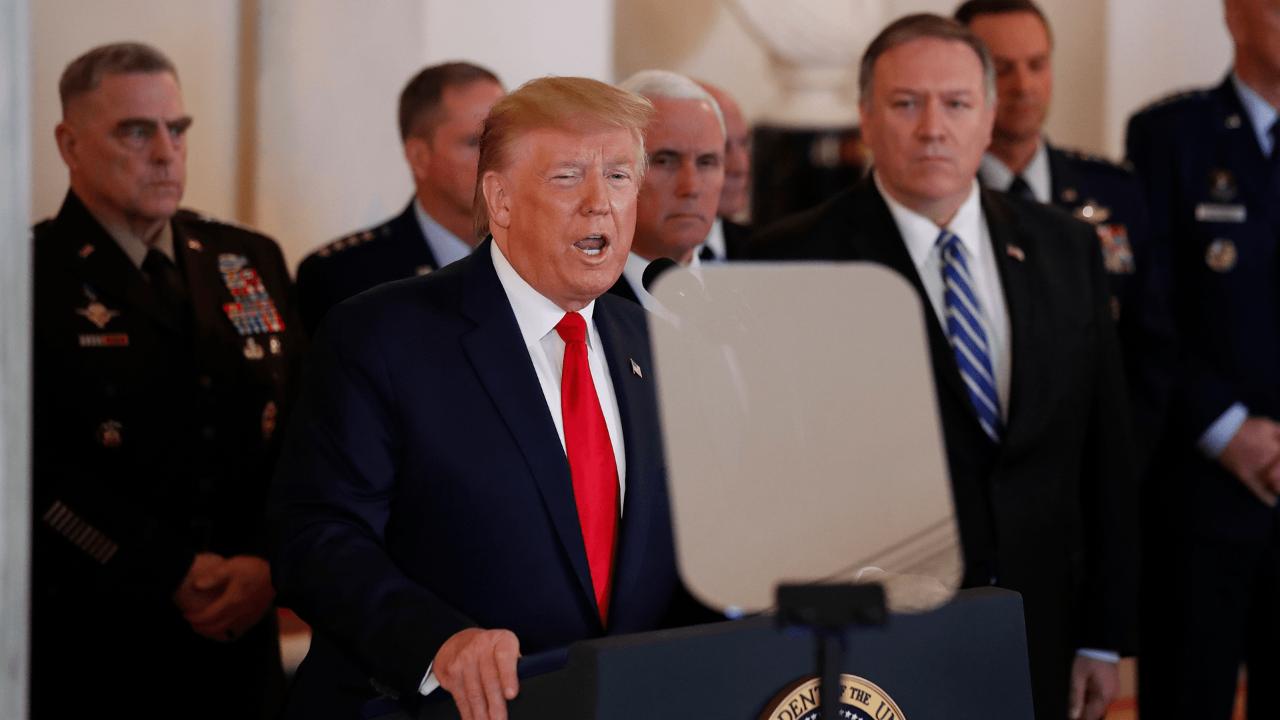
Although the president’s nine-minute speech urged de-escalation between Washington and Tehran, Trump said he would “immediately impose additional punishing economic sanctions” on the Iranian regime and revealed that he planned to ask NATO to “become much more involved in the Middle East process.”
The brief invocation of the western military alliance comes just a month after Trump traveled to London to attend its annual meeting of world leaders. During his turbulent appearance at that summit, Trump chided his fellow government heads for their defense spending contributions, and drew scrutiny for his administration’s jarring series of policy shifts in Syria.
A NATO spokesman announced over the weekend that the alliance had “temporarily suspended” its training of defense forces and military institutions in Iraq, meant to block the resurgence of the Islamic State, amid the regional turmoil.
Later Wednesday, a White House spokesman said Trump had spoken with NATO Secretary-General Jens Stoltenberg and “emphasized the value of NATO increasing its role in preventing conflict and preserving peace in the Middle East.”
Trump’s latest posture toward Iran has significantly diminished the likelihood of further armed conflict in the aftermath of the missile attacks, which were precipitated last week by the killing of Tehran’s top military commander in a U.S. drone strike.
Trump on Wednesday defended his order to remove Qassem Soleimani, the leader of Iran’s elite paramilitary Quds Force, from the battlefield, describing him as “personally responsible for some of the absolutely worst atrocities,” and again insisting his death prevented future attacks on American interests.
The president also called upon the signatories of the 2015 multinational nuclear accord with Iran — China, France, Germany, Russia and the United Kingdom — to “break away from the remnants” of the pact and work together toward striking a new one “that makes the world a safer and more peaceful place.”
Trump fiercely criticized the previous administration for negotiating the deal, which allowed Iran access to financial assets he claimed Tehran used to fund a “terror spree” and pay for the “missiles fired last night at us and our allies.”
Susan Rice, who served as national security adviser under former President Barack Obama, dismissed those charges as “another series of despicable lies” by Trump, and denounced his decision to pull the United States out of the deal in 2018.
“President Trump decided recklessly to withdraw unilaterally from the nuclear deal and impose so-called ‘maximum pressure,’ crippling sanctions,” she told MSNBC. “And it was in the wake of that that we found ourselves in this escalatory cycle that has led to where we are today — a very dangerous moment.”
Despite the fiery rhetoric for Soleimani and Obama, just before turning from the news cameras and departing the podium, Trump made one of his most conciliatory overtures since the most recent period of heightened tensions with Tehran began roughly two weeks ago.
“Finally, to the people and leaders of Iran, we want you to have a future, and a great future. One that you deserve. One of prosperity at home, and harmony with the nations of the world,” he said. “The United States is ready to embrace peace with all who seek it.”
The White House address marked the president’s first public statement, on social media or otherwise, since he declared that “All is well!” in an optimistic tweet following the attack Tuesday evening.
“Missiles launched from Iran at two military bases located in Iraq. Assessment of casualties & damages taking place now. So far, so good! We have the most powerful and well equipped military anywhere in the world, by far!” Trump wrote, adding that he intended to comment further Wednesday morning.
Iranian Foreign Minister Mohammad Javad Zarif also issued a tweet Tuesday seemingly aimed at tamping down the potential for additional hostilities. The Islamic Republic does “not seek escalation or war, but will defend ourselves against any aggression,” he wrote.
But Trump’s assessment that Iran is now “standing down” diverged with an ominous speech Iran’s supreme leader delivered earlier Wednesday morning in the holy city of Qom. “They were slapped last night, but such military actions are not enough,” Ayatollah Ali Khamenei said of the Iranian missile salvo.
Wednesday was not the first time Trump, faced with the potential for a prolonged confrontation, has moved to defuse pressure on the U.S.-Iran relationship.
This past summer, as the two countries feuded over what the U.S. alleged were Iranian attacks on international oil tankers, the president called off a U.S. military strike against Iran after Tehran downed an American drone, saying he had decided the action was not worth the potential cost in lives.
Source: politico.com
See more here: news365.stream






